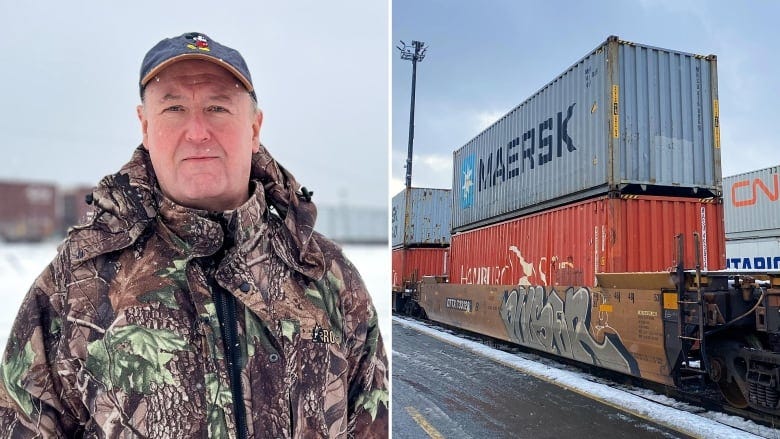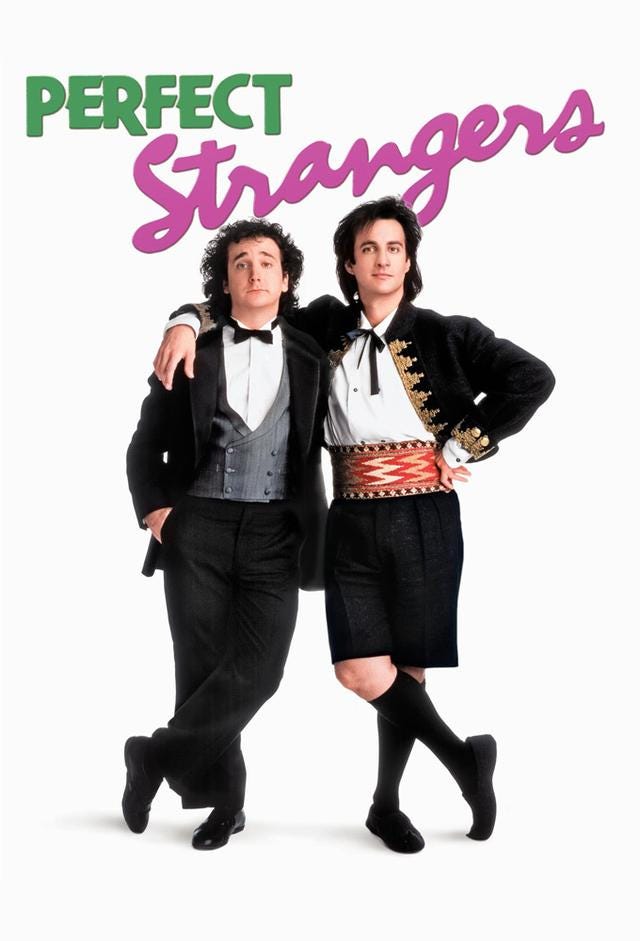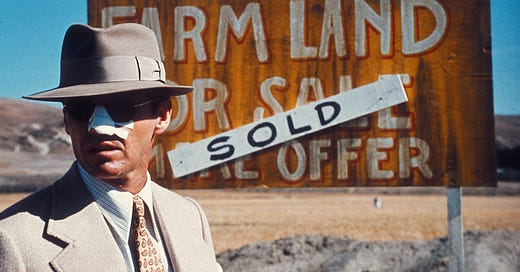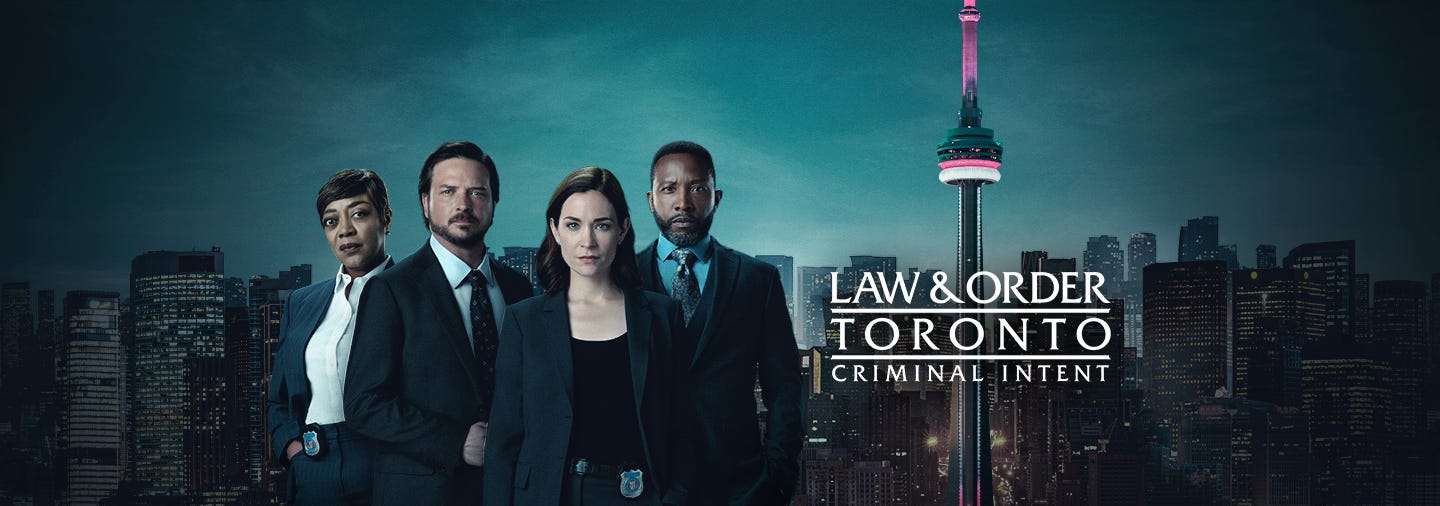Forget it, Jake. It's Canada.
Canadians' increased tolerance for corruption is a dark sign that we've become desensitized to the threat of totalitarianism.
YOU CAN LISTEN TO ME READING THIS ARTICLE HERE:
The corrupt will always seek power, and absolutely any organizational entity bestowed with authority, even benign or mundane-seeming authority, has the potential to draw corrupt people into it. Sometimes, the more benign an authority seems, the less scrutiny and oversight it attracts, and the more corrupt it’s likely to become.
In Chinatown, Roman Polanski’s 1974 neo-noir, it was a lowly municipal utility, the L.A. waterworks, at the centre of a grand, murderous conspiracy. Why should anyone be concerned about oversight at the Water Department, when after all, they simply make sure the pipes and the sewers don’t clog, right? Well, it turns out that in early 20th-Century California, municipal water authorities also got to decide which lands would be expropriated to make way for massive dams and reservoirs. In Polanski’s Chinatown — a fictional story, but not too far fetched from the real-life California Water Wars — untold fortunes and many livelihoods were suddenly in the hands of a few engineers isolated from public scrutiny, and the most corrupt men in the populace pounced upon this loophole before anyone else noticed.
I can’t help but see the shadow of Chinatown looming over the many crises currently plaguing Canada. It feels like there’s corruption everywhere I look.
For example, here’s one such corruption crisis: my city, Toronto, is in the midst of an auto theft epidemic that’s gotten so bad it’s making headlines around the world. Cars are suddenly disappearing from driveways across the city, and no one seems to know how to stop the thieves.

This strikes me as bizarre, because in the age of Apple AirTags and GPS, we can track almost in real-time exactly where the cars end up within hours — perhaps minutes — of being taken: they’re at the railyards, parked inside shipping containers.
The problem is that due to a little-known historical quirk, a major railway network, which extends across Canada and deep into parts of the US and Mexico, maintains its own strange, independent police jurisdiction, under the authority of a tiny agency of about a hundred officers, quaintly named the Canadian Pacific Kansas City Police Service. Why should anyone be concerned about oversight over some barren stretches of train tracks, right? Well, it seems criminals have discovered that these narrow extra-jurisdictional corridors slice right through Toronto, they have plenty of vehicular access points throughout the metro area, and they’re rapid, convenient transport conduits which lead directly to faraway ports on the East and West Coasts.
Now, I’m not saying that the CPKC cops are in cahoots with organized crime, but for some strange reason, the second Toronto’s stolen cars cross the line from city police jurisdiction to railway “Kansas Keystone Cops” property, inter-agency miscommunication and bureaucratic red tape inevitably gums up the time-sensitive process of intercepting the goods until they’re clear outside the country, oceanbound for black markets in Asia and Africa. And we can watch them rumble out on their transcontinential journeys while we’re standing just a few yards away in the middle of Toronto in broad daylight, powerless to intervene.

Of course, Toronto and its neighbouring cities’ police are free to arrest the car thieves themselves once they step off of railway land, but here’s the kicker: amid decades of activism from the left, culminating in blaring choruses of “defund the police,” law enforcement has lost the power to incarcerate ostensibly low-level criminals such as car thieves, even when they’re proven to be members of organized crime — even when they’re convicted of violent, armed carjackings. Canadian car thieves can have decades-long careers in organized crime, even after getting caught and convicted repeatedly, because they can’t be sentenced to more than a few months’ house arrest, and they’re usually not sentenced at all. (In fact, Canada has become something of an international training school, where global car theft rings send their protégés to get hands-on experience.) Without the power to jail them, the cops have lost the incentive to make arrests. They’ve all but given up.
Forget it, Jake. It’s Canada.
The Rise of Poutine Totalitarianism
Predicaments like this are rampant, and Canadians have become inured to corruption and dysfunction within the systems that govern our day-to-day lives. Such situations tend to have the same two things in common:
They involve some small body of authority that lacks proper oversight & accountability.
The authority gains outsize power though a superficial appeal to progressive values. (This may be instigated by the people inside the authority vying to increase their own power, or by outsider activists appealing to give more power over to them.)
That second condition is the secret sauce — the gravy on our poutine, if you will — that makes Canada uniquely susceptible to systemic corruption right now: we’re a people terrified to challenge anyone who claims to hold a progressive moral authority, and this has turned our country into a confederacy of kangaroo courts. There’s a critical mass among our populace: cowardly subjects who’ve been conditioned to automatically defer to any suggestion that’s presented to us as progressive, and to cede the ground of moral authority to anyone who simply gestures at being entitled to it.
In the case of the car theft epidemic, there’s at best dysfunction and at worst complicity from the railway police. That’s condition #1, which I like to call “The Opportunity,” an opening that corrupt people will intuitively sense and manoeuver to exploit. This is combined with the defanging of municipal law enforcement by progressive activists. That’s condition #2 — “The Woke Cloak,” the aura of moral untouchability which lulls Canadians into complicity even when they sense that something might be amiss.
The government recently announced that they’re putting $28 million into efforts to curb the car theft crisis. But this is just throwing good money after bad, an open call for more corruption. Here, I can solve your car epidemic for free: hold the railway police to account or revoke their jurisdiction in the metro Toronto area, and tell the activists to fuck off while you re-empower the courts to jail members of organized crime.
You’re welcome. And you can keep the 28 million dollars.
There are more examples of Canada’s special style of corruption everywhere you look. Right now as I write this, I’m sitting in my rental apartment, which has been in a state of construction for over a year. My landlord, an agency of the City of Toronto, has mired my building in a dodgy renovation contract with dubious claims to improve energy efficiency. The project managers evaded building code standards in order to slash costs — even going so far as to doctor the engineering plans in an attempt to circumvent regulators. Now, years of planning and tens of millions of dollars later, the work is halted and my apartment’s stuck in limbo. I’m sitting here writing this amid a heap of exposed wiring, hole-riddled drywall, and mechanical equipment where the finished walls and ceiling of my living room should be. Like the car theft crisis, this kind of situation is typical of 2020s Canada: bureaucrats at the housing authority are in charge of perhaps hundreds of millions of dollars in construction funds without proper oversight (that’s condition #1, The Opportunity), and the inevitable corruption that ensues is exacerbated and justified with faux-progressive sloganeering — in the case of my apartment building, they’re greenwashing the dubious nature of a lucrative construction contract with claims of improving energy efficiency (that’s condition #2, The Woke Cloak).
I turn on the news and every other story has the same shape. Take today’s top story, the ArriveCan scandal: at the height of the pandemic, the Liberal government introduced a simple smartphone app to facilitate the screening process for travellers entering the country. This was an app so basic I could have whipped it up myself in an afternoon. (To be fair, I was a professional software developer for a decade.) But because the authority in charge of implementing it had access to unlimited government funds without commensurate oversight (condition #1, The Opportunity), and the project was loaded with progressive virtue signalling around the pandemic (condition #2, The Woke Cloak), corruption took hold and flourished. Upwards of $100 million — yes, million — have since disappeared amid a feeding frenzy of dubious invoices from do-nothing entities supposedly involved in creating the app. We may never know how much money was lost, because even basic record keeping was skipped by the people in charge. They were allowed to get away with this staggering level of corruption because, in true Canadian style, they gestured at faux-progressive virtue signalling, and this gave the countless people who surely caught wind of the scam which was taking place out in the open, who should have felt a sense of duty to speak up and say something, just enough incentive to look the other way instead. Once again: Forget it, Jake. It’s Canada. Corruption wrapped in virtue is now the norm.
By now, practically every Canadian has had a direct, personal encounter with a corrupt authority hiding behind faux-progressive virtue. It usually comes in the form of the DEI (Diversity, Equity, and Inclusion) initiatives that have infiltrated almost every workplace and learning institution in the country, forcing employees and students to nod along while they’re presented with a list of outlandish, childish “received truths” they’re no longer permitted to question. (More often than not presented by someone dressed in an outlandish, childish style to match.) Not even the self-employed are immune: for example, Jordan Peterson has been ordered to attend re-education sessions by the regulatory authority that oversees his private psychiatry practice, for the crime of posting some cranky tweets that avouch views they don’t like. Yet again: a small body of authority gains outsize power and turns corrupt via progressive virtue signalling. And anyone who dares to criticize these excesses is demonized as a cartoon villain out to destroy the Canadian way of life and inflict untold suffering on our most vulnerable citizens.
Oh, Canada!
Things have gotten so bad that perhaps Chinatown isn’t a strong enough analogy for Canada in 2024 after all. It’s starting to feel more like East Germany circa 1954: so corrupt, and so rife with self-righteous little proto-totalitarians eager to turn against their colleagues, their friends, and their relatives over supposed crimes against the collective Good, all you can do is keep your mouth shut and try to grin and bear it, or better yet: get out while you still can.
The Berlin Firewall
If Canada is a proto-East Germany in the making — and I think it is — then the erection of our Berlin Wall will be Bill C-63, the proposed Online Harms Act.
Recall that the Wall was introduced amid propagandistic fanfare about protecting people from harm while it thwarted people’s freedoms in the most explicit way possible: erecting a prison wall around them. Its official name in the East was The Anti-Fascist Protection Rampart, though in West Berlin it came to be known as the Wall of Shame.
Likewise, Bill C-63 could just as well be called the Anti-Fascist Protection Firewall, given the propagandistic fanfare supporting it from the more gullible quarters of the erstwhile Canadian left. I myself am still a member of the left I suppose — although I feel that the paradigm of left and right has largely outlived its usefulness amid the chaos of the times — but I’ll be calling it the Firewall of Shame if it succeeds in going up.
The Online Harms Act is classic Canadian corruption — poutine totalitarianism — playing out right in front of us, dialled up to eleven: it proposes to grant vast, sweeping new powers to two bodies of authority that lack commensurate oversight, supercharged with the language of faux-progressive virtue. Only this time, the powers they’ll be granted are ultimate, and the necessary, commensurate oversight is literally impossible.
The Act proposes to deputize a brand new five-person authority, the Digital Safety Commission, and to grant these five people the power to block any information on the Internet that they deem sufficiently “harmful,” plus the power to “compel information, search any place, access records by means of telecommunications and seize records” and to impose massive financial penalties on social media companies to enforce compliance.
The Act also adds vast new powers to a pre-existing but heretofore not-very-powerful authority, the Human Rights Commission. This institution is presently just a workplace arbitrator, a place to seek a modestly-capped amount of financial compensation from your employer if you feel you’ve been discriminated against.
The Human Rights Commission is already a mess, caught up in a purity spiral, with its own employees alleging “Anti-Black racism, sexism and systemic discrimination” in the workplace. (Ironically, they sought redress via a different channel: grievances filed through their union.) And other branches of Canada’s sprawling, disgruntled bureaucracy have piped up with complaints that the Human Rights Commission isn’t pure enough to live up to its lofty name. (Purity spirals and discrimination grievances have become Canada’s twin national pastimes.)
Despite its current problems, the Human Rights Commission’s purview is to be greatly expanded to cover personal complaints of discrimination not just from people’s bosses, but from anyone on the Internet — including you, if you happen to find yourself within the borders of Canada. A perfect stranger would be able to file a grievance against you; the Digital Safety Commission could use its powers to identify and locate you; and the Human Rights Commission could then put you in front of a tribunal and force you to pay up to $50,000 to your accuser for fomenting “detestation or vilification of an individual or group” on the basis of: “race, national or ethnic origin, colour, religion, age, sex, sexual orientation, gender identity or expression, marital status, family status, genetic characteristics, disability,” and in certain circumstances, a prior criminal record.
Worse still, the Act introduces scary new amendments to the Criminal Code, opening the door for Crown prosecutors to imprison you for harms against the same roster of protected characteristics. (Did you notice that the list is so broad that even mere “gender expression” is in there? Which means what exactly? A guy with long hair? A gal with a buzz cut?) The courts will be empowered to pursue prison sentences against individuals ranging from 5 years up to life imprisonment, established at ill-defined thresholds, like “incites detestation stronger than dislike” and “promotes genocide.”
Take a minute to process that. A violent career criminal who hijacks cars for a living gets inconvenienced with a couple months of boredom at home watching Netflix with an itchy GPS bracelet strapped to his ankle, while you could wind up bankrupt and doing hard time if a lawyer can persuade a few already overzealous and self-righteous bureaucrats that anything you have ever posted or tweeted online — I repeat, ever — could be said to have “incited detestation” or “advocated genocide.”
Anyone could file a complaint at will with these two Commissions, anytime — the Digital Safety Commission to get stuff you don’t like taken down or blocked from being accessed within Canada, and the Human Rights Commission to try and take all your opponents’ money and get them thrown in prison while you’re at it. And we all just have to trust that whoever the people are inside these commissions, they’ll separate the “bad” complaints from the “good” ones (whatever that even means), and only do what’s best for the Good of the people (again, whatever that means).
Have you heard the rhetoric coming from university campus activists these days? Everyone is their opponent. Everyone is “inciting hate”. Everything is “genocide”. Canada, you decided that now is a good time to supercharge online conflicts and especially that word with the power to put people behind bars for life?
You sure about that??
People routinely point out that episodes of beloved sitcoms which aired not long ago “didn’t age well” because their content is newly understood to be -ist or -phobic according to our ever-purifying standards of supposed enlightenment. Well soon, “didn’t age well” might mean they’ve been made completely inaccessible in Canada by the Digital Safety Commission. The creators of Perfect Strangers might soon have to pay damages to perfect strangers who claim harm from having viewed their content. They might even go to jail over things they wrote years ago.

This isn’t hyperbole. Just remember: you will get no say in the oversight of any of this, ever. You will never get to vote in or out the five members of the Digital Safety Commission or god-only-knows who makes up the Human Rights Commission. You will never get to dispute what they deem to be “detestation” or “genocide”, not now, and not in the future, no matter where the political tides take us all.
If control over a few water engineers (as in Chinatown) or a few strips of railway that crisscross Toronto are points of weakness and easy targets for nefarious exploitation due to their comparative lack of oversight relative to the amount of power they wield, imagine how sweet a target will become these commissions that control what anyone in the entire country says throughout the entire online domain. You’re mad if you don’t think that everyone will be clamoring to persuade and control these bodies all the time. And you’re madder if you don’t think that some people will eventually succeed in corrupting them. Especially in Canada’s current culture, already inured to the idea that wokeness is a justification for rampant corruption.
The bill’s defenders insist that the bill is “about” more than censorship and that it’s all “about” good intentions and most of all about “protecting kids”. Indeed, there are some parts in the bill about child abuse and revenge porn that I think are fine, because they’re clearly defined and they fit within the already established criminal framework. But we need a lot more than promises of good intentions when they’re imposing massive consequences around vague terms like “detestation stronger than dislike” and “promote genocide” and putting it all in the hands of yet more opaque kangaroo courts.
It would be great if there was no hate on the Internet. Who doesn’t want an internet free of cruelty and crime and fake news and miserable trolls? But it’s not so simple. No one on Earth has yet figured out how oversight over such powers can work. Right now it’s literally impossible. Amid all the fuss over AI, tech companies are grappling with the question of how to instill the “correct” bias into their artificial intelligences. Google’s Gemini AI has decided that “misgendering” Caitlin Jenner is worse than a nuclear holocaust, and that Elon Musk tweeting memes is in its view equally as bad as the actual Nazi Holocaust that killed millions of Jews.
If the most powerful AIs in the world can’t figure it out, I hold little hope for five randos assigned by the Liberal government to do better.
Faint signs of hope? Or a genie out of the bottle?
There are possible signs of hope that Canada may yet pull back from the brink. A recent poll published by the National Post shows that the majority of Canadians agree with the sentiment “everything is broken in the country right now.” Perhaps we’re not so inured to corruption after all. But then again, there are signs that some of the respondents believe that Canada is broken because it doesn’t lean far enough into totalitarian authority to solve our social ills. If so, this is the opposite of a sign of hope.
That’s the problem when things go off-kilter and our trust networks get broken: no matter which side of the fence the political ball lands, left or right, once totalitarianism’s grip starts to tighten, it doesn’t readily loosen, even after a power shift, and we end up with two parties pushing competing dystopian visions. The US far right’s MAGA movement is as far from the Canadian woke left as possible, and their attempt to overturn the election is proof enough that the impulse to seize absolute power has become just as bad on the other side. The genie of totalitarianism is threatening to get out, and the extremes on both sides share the blame.
What I meant when I said earlier about still identifying with the left, even though left and right are losing much of their meaning? I meant that I still uphold as paramount the principles of egalitarianism, that certain specific groups face more discrimination than others within society, and that there is still much work to be done to bring fairness and justice to them, and to society as a whole. These have always to me been the core principles that define the left and what it means to identify as “left”, or “liberal,” or “progressive.” (Although I’ve pretty much abandoned that last moniker, as to me “progressive” has come to connote the excesses of the left, and of infintely pushing leftward for its own sake, and denying even the possibility that a place of equilibrium in the political landscape can ever be found.)
But I believe that the way to achieve these goals is through a balance of means, including a focus on education and social tools such as persuasion and campaigning, not simply through naked appeals to brute force, to demanding that authorities forrcibly impose correctives to perceived social injustices. And that’s specifically because once we grant authority it’s very difficult to take it away.
We’re overdue for a federal election in Canada. And it’ll be an easy win for the Tories, with widespread dissatisfaction with Trudeau’s Liberals. This gives me a bit of hope that some of Trudeau’s excesses will be curbed, and that we might see the beginning of a turn away from the widespread culture of woke corruption that permeates the national zeitgeist. But still I worry that the long-term prospects for Canada are dire, because neither side, Blue nor Red, should wield so much power that the Liberals are trying to forge with their Firewall of Shame.
In the meantime, while we all wait and see what a new election brings, at least there’ll be entertainment.
Law and Order, the venerable TV series of ripped-from-the-headlines crime stories has just launched a new spin-off that takes place right here in Toronto. I’m not surprised. With all the corruption going on in Canada, their writers have no shortage of material to draw from.








Great article Arty. You’re a talented and convincing writer.
Things in the U.K. not much better. Politicians terrified or for some other reason paralysed into inaction. I’m starting to think we may need to sack 50% of the civil service, they just don’t enact policy they disapprove of and they are completely captured by wokery. The result is even the Tories can’t get anything done about education. So we sack half of them and the rest better get the fucking message: Do. Your. Jobs.
Terrific and terrifying read, Arty. I used to think that Canada was this great place of opportunity for British people (and others) to emigrate to. It probably was back in the day, and I am truly sorry to see it sink into the woke morass. Sad.